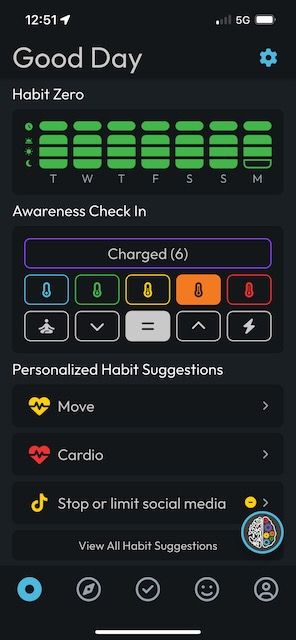
How To Become 25% Happier
A regular gratitude practice is not just some self-help mumbo jumbo - it’s been scientifically proven to rewire our brains for happiness.
Studies have shown that people are 25% happier with a weekly gratitude practice.
Gratitude & The Brain
Two things are happening within the brain that keep us stuck.
The first is hedonic adaptation, and the second is our negative bias.
Let’s begin by looking at hedonic adaptation.
Step off the hedonic treadmill.
The hedonic treadmill, also known as hedonic adaptation, is the observed tendency of humans to quickly return to a relatively stable level of happiness despite major positive or negative events or life changes.
We think that when we get that promotion, earn six figures, get our dream home, and find the ideal mate, then we will be happy.
The problem with this approach is that it leads to never-ending anxiety because as soon as we achieve something, it doesn’t meet our expectations, and we start chasing something else.
Your happiness can only be found when you LET GO of the clinging, striving, judgement, expectations, compassion, and control and shift your focus to appreciating what you have now and how far you have come.
Positive to negative ratio of 3 to 1 (that’s three positive thoughts for every negative).
Our brains are wired to look for problems - and if we let it - our inner critics will make us miserable.
To overcome our negative bias, we need a ratio of 3 to 1 - that’s three positive thoughts for every negative one.
When you notice a negative thought, see if you can reframe it by looking for the positive in the situation.
This was one of the first practices I installed on my mindful habits journey over 30 years ago, and it has made a massive difference in the quality of my life.
The good news is that we can overcome hedonic adaptation and negativity bias with one simple practice - Gratitude!
5 Benefits of Gratitude
The benefits of a regular gratitude practice are numerous. Here are just a few.
1. Gratitude makes you happier.
Gratitude has been shown to strengthen positive emotions, reduce feelings of envy and anger, make our memories happier, let us experience good feelings, and help us bounce back from stress.
2. Gratitude attracts positive relationships.
Nobody likes hanging out with other negative people (except for other negative people)
To attract positive people into your life, you need to be more positive.
A simple gratitude practice will make you friendlier, improve your marriage, be more respected, have more friends (and a better quality of friends), and deepen your closest relationships.
3. Gratitude makes us healthier.
Gratitude has been shown to decrease pain, reduce bad health symptoms, and lower blood pressure.
It has also been shown to increase time spent exercising, sleep time, sleep quality, and overall energy.
4. Gratitude builds confidence.
Grateful people are more optimistic, less materialistic, more compassionate, less self-centred and have higher levels of self-esteem.
5. Gratitude helps us professionally.
Grateful people are better leaders and team players, achieve goals, have improved decision-making, and are more productive.
3 Gratitude Practices
Gratitude doesn’t need to be complicated; it just takes a few minutes each day.
Here are a few practices to get you started.
1. A genuine thank you
Most of us rush the thank you or saying thanks without thinking about it.
The next time you say thank you, stop and pause, think about how grateful you are for this person and say thank you with intention.
2. Gratitude journal
At the end of each day, identify 3 to 5 things you are grateful for or, once a week, brain-dump all the things you are thankful for.
3. Meal-time gratitude
Share 1 or 2 or 3 things you are grateful for with your family.
Wrap Up
Each of the practices may seem awkward or difficult at first.
That’s why it’s called a practice - Do them anyway!
You will be grateful that you did.





